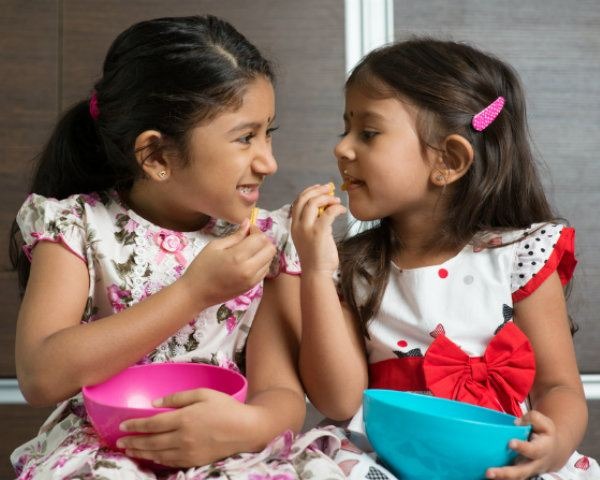What You Need To Know About Your Toddler's Nutrition
Parents easily have the toughest jobs out there. And as most parents will tell you, kids do not come with an instruction manual. Lucky for new parents out there, there is a ton of good advice to follow to help guide them through murky waters of children's nutrition information.
Dr. Scott Cohen, practicing pediatrician and bestselling author of the book Eat, Sleep, Poop: A Common Sense Guide to Your Baby's First Year, knows a thing or two about getting your toddler on a nutritious track.
"I get a lot of questions about toddler nutrition, especially because it's really trying when your toddler never wants to eat or only eats one or two things," Cohen explains. "I believe moderation works best. It is OK for children to have snacks and desserts. Those who abstain from treats 100 percent tend to try and seek out and abuse. It's important for parents to be in control and have children eat something you want them to eat first. If a child knows they can skip lunch and just to go to pantry and get goldfish they will do it every time. "
While parents will face numerous unique challenges throughout their child's life, the nutrition portion doesn't all have to be weathered on a wing and prayer. We asked Dr. Cohen to answer some vitally important questions about your child's nutrition plan to help you make sure your little one is set up for a healthy life.
What are 5 things toddlers need in their diet and why? How do you help picky eaters try new things?
There are five things that are most important in their diet:
One is to make sure they're getting DHA. DHA is an omega-3 fatty acid that's really important for brain development. Unfortunately, toddlers are only getting about 25 percent of the recommended amount of DHA. Mainly, because the big source of DHA is fish. And as you can imagine with those picky toddler years, they're not eating fish. So we want to find ways to bridge that gap and get DHA in their diet through things like Enfagrow. Enfagrow not only has DHA, but vitamins A, B, C, D, E, zinc, calcium and iron that children need. A child's brain grows 85 percent in the first three years, and DHA is an important building block of the growing brain.
Number two is calcium intake for strong bones, muscles, and teeth.
Number three is a protein source like meat, eggs, fish, dairy, beans, or soy products.
The last two are really more healthy eating habits. Healthy eating habits are more important than volume. Don't try to chase your child around with a spoon or put them in front of the TV just to have them get one more bite. You're there to offer. Their job is to decide what they're going to take, and if they're not hungry, it's okay, they're not going to starve themselves. Lastly, variety is key. Try to offer three or four different things at a meal. Lots of different colors and shapes — a fruit, a vegetable, a protein source, a dairy source — so that they're getting a wide balance and variety of vitamins and minerals. Don't give up; the food they hated last week they may love this week.
What are some tips for transitioning from baby food to solid food?
It's really important to follow your child's cues. When starting to offer solids at 6 months, you can offer pureés, but you can also try different textures; a piece of banana or a cooked carrot for example. It is sometimes hard to relinquish control, but let your child explore the foods they're eating and make a mess. If your child chokes or gags while trying a new food, take a step back and purée it a bit more or mush it up with your fingers. In recent years, we have strayed away from the conservative approach of starting with rice cereal/vegetables and fruits, introducing solids one food at a time and waiting three days before introducing another food. Now, we recommend children eat anything when they start solids so long as they are small, soft pieces to prevent choking. Early introduction to a wide variety of foods creates a better, more adventurous eater, and may decrease food allergies because we are [de]sensitizing the child to that food early on. So, if a parent wants to put eggs, fish, citrus, yogurt and peanut butter in a blender, it's fine (though not very appetizing). The only food a child should not have in first year is raw honey due to the danger of botulism.
What foods are most dangerous for toddlers and why?
Parents should stay away from common sense choking foods like whole grapes, hot dogs, hard candy, and chewing gum.
Are there toddler foods/formulas to avoid? What are the worst things to feed your toddler?
Again, parents should stay away from common choking foods. It's fine to introduce spices in to a toddler's diet, but avoid adding extra salt. It's important to remember that what a child gets used to is what they will ask for later. Juices and other very sugary snacks should be given in moderation. If you're going to give them juice, limit it to less than four ounces per day and water it down, but, of course, it's better to give milk and water instead. Toddlers don't need any fast food or soda in their diets.
